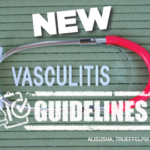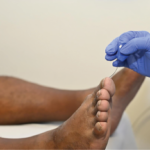 EULAR 2022 (VIRTUAL)—Rheumatologists and patients alike often benefit from the recommendations produced by national and international professional societies that help synthesize the medical literature and provide guidelines for diagnosis and management of diseases. At the 2022 Congress of the European Alliance of Associations for Rheumatology (EULAR), updates of recommendation on anti-neutrophil cytoplasmic antibody (ANCA) associated vasculitis (AAV), axial spondyloarthritis (axSpA) and rheumatoid arthritis (RA) were presented in a thorough and helpful manner.
EULAR 2022 (VIRTUAL)—Rheumatologists and patients alike often benefit from the recommendations produced by national and international professional societies that help synthesize the medical literature and provide guidelines for diagnosis and management of diseases. At the 2022 Congress of the European Alliance of Associations for Rheumatology (EULAR), updates of recommendation on anti-neutrophil cytoplasmic antibody (ANCA) associated vasculitis (AAV), axial spondyloarthritis (axSpA) and rheumatoid arthritis (RA) were presented in a thorough and helpful manner.
ANCA-Associated Vasculitis
Bernhard Hellmich, MD, chair, Department of Medicine, Rheumatology and Immunology at the Medius Klinik Kirchheim, Kirchheim Unter Teck, Baden-Württemberg, Germany, began the session with an overview of recommendations for AAV. Dr. Hellmich noted that the prior sets of EULAR guidelines for the management of AAV, which came in 2008 and 2016, were in need of updating given new research and clinical developments in the field.
Several overarching principles for the recommendations on managing AAV include: 1) Patients with AAV should be offered the best care based on shared decision making between the patient and the physician considering efficacy, safety and costs; 2) patients should have access to education focusing on the impact and prognosis of AAV, including potential treatment-related complications; and 3) patients should be periodically screened for treatment-related adverse effects and comorbidities and be guided with prophylaxis and lifestyle modification recommendations to reduce complications and comorbidities.
In addition, AAV is rare, heterogeneous and potentially life- and organ-threatening, so multidisciplinary management is essential.
A new recommendation included using testing for both proteinase 3 (PR3) ANCA and myeloperoxidase (MPO) ANCA using a high-quality, antigen-specific assay—as opposed to indirect immunofluorescence—as the primary method of testing in patients with potential signs and/or symptoms of AAV.
A revised recommendation is that rituximab is now the preferred agent for treatment of patients with organ- or life-threatening AAV with relapsing disease.
The group also revised a recommendation on induction of remission in patients with non-organ- and non-life-threatening AAV and now note that rituximab, rather than methotrexate, should be the first-line agent. This is in part because treatment with methotrexate or another agent—mycophenolate mofetil—often leads to patients requiring higher doses of concomitant glucocorticoids.
GPA & MPA
Another new recommendation uses the PEXIVAS trial to guide the quicker tapering of glucocorticoids for patients with granulomatosis with polyangiitis (GPA) or microscopic polyangiitis (MPA).1 PEXIVAS also evaluated the use of plasma exchange, and EULAR now recommends against plasma exchange for routine use in treating alveolar hemorrhage in patients with GPA/MPA. Plasma exchange can be considered for remission induction in patients with serum creatinine >300 µmol/L due to active glomerulonephritis.



